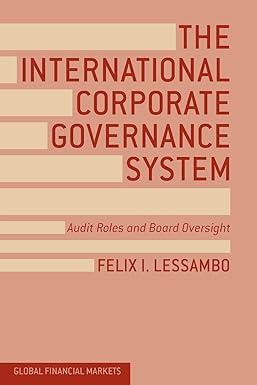Question
I need answers to these questions. I really appreciate your help in advance. 8 - ITEMS MULTIPLE CHOICE 1. When the session date is advanced
I need answers to these questions. I really appreciate your help in advance.
8 - ITEMS MULTIPLE CHOICE
1. When the session date is advanced to the first day of the next year, Sage 50 Accounting:
a. Closes the revenues and expenses, transfers the net income/loss and drawings/dividends for you and prepares the General Journal entry.
b. Closes the revenues and expenses, transfers the net income/loss and prepares a General journal entry.
c. Closes the revenues and expenses, transfers the net income/loss to Capital or Retained Earnings but does not prepare a General journal entry.
d. Will generate journal entries for the closing entries specified at your request in System Setup.
2. In Sage 50 Accounting, when the session date is advanced to the first day of the next fiscal year, which of the following is true.
a. The program resets the temporary accounts balances to zero but continues with the next journal entry number in sequence.
b. Requires the user to input the closing entry to transfer the Drawings balance to Capital or Dividends Declared to Retained Earnings.
c. Maintains PROJECT module detail recognizing that projects may not always start and finish within fiscal year.
d. The fiscal year dates (Start, End) must be confirmed in the System Setting.
3. In Sage 50 Accounting when the session date is advanced to the first day of the next fiscal year, which of the following entries need to be reversed.
a. Estimated bank statement charges, Depreciation of capital assets, salary accrual.
b. Depreciation of capital assets, salary accrual (weekly payroll) and office supplies.
c. Estimated bank statement charges, salary accrual (bi-weekly payroll), prepaid supplies.
d. Estimated bank statement charges, salary accrual (bi-weekly payroll) and interest accrued (due monthly on the of each month).
4. In the new fiscal year, which of the following does not need a reversing entry at the beginning of the year.
a. Estimated Bank Service charges.
b. Accrued Expenses.
c. Prepaid Insurance.
d. Accrued Salary/Wages.
5. Which of the following is true for an Outstanding Deposit:
a. Amounts recorded by the bank which do not agree to the General Ledger.
b. Amounts recorded in the companies books, but have not been deposited to the bank.
c. Amounts recorded in the companies books that belong to another company.
d. Amounts recorded in the bank statement, but the amounts belong to another company.
6. In the BANKING Module, an unresolved balance is:
a. The General ledger Bank account balance after the bank reconciliation adjustments have been recorded.
b. A priority for the bank to correct on their records.
c. The difference between the Bank Statement and the General Ledger bank account.
d. Usually written off as immaterial.
7. When the session date is advanced to the first day of the next year, Sage 50 Accounting:
a. Closes the revenues and expenses, transfers the net income/loss and drawings/dividends for you and prepares the General Journal entry.
b. Closes the revenues and expenses, transfers the net income/loss and prepares a General journal entry.
c. Closes the revenues and expenses, transfers the net income/loss to Capital or Retained Earnings but does not prepare a General journal entry.
d. Will generate journal entries for the closing entries specified at your request in System Setup.
8. In Sage 50 Accounting, when the session date is advanced to the first day of the next fiscal year, which of the following is true.
a. The program resets the temporary accounts balances to zero but continues with the next journal entry number in sequence.
b. Requires the user to input the closing entry to transfer the Drawings balance to Capital or Dividends Declared to Retained Earnings.
c. Maintains PROJECT module detail recognizing that projects may not always start and finish within fiscal year.
d. The fiscal year dates (Start, End) must be confirmed in the System Setting.
The fiscal year dates (Start, End) must be confirmed in the System Setting.
Step by Step Solution
There are 3 Steps involved in it
Step: 1

Get Instant Access to Expert-Tailored Solutions
See step-by-step solutions with expert insights and AI powered tools for academic success
Step: 2

Step: 3

Ace Your Homework with AI
Get the answers you need in no time with our AI-driven, step-by-step assistance
Get Started


